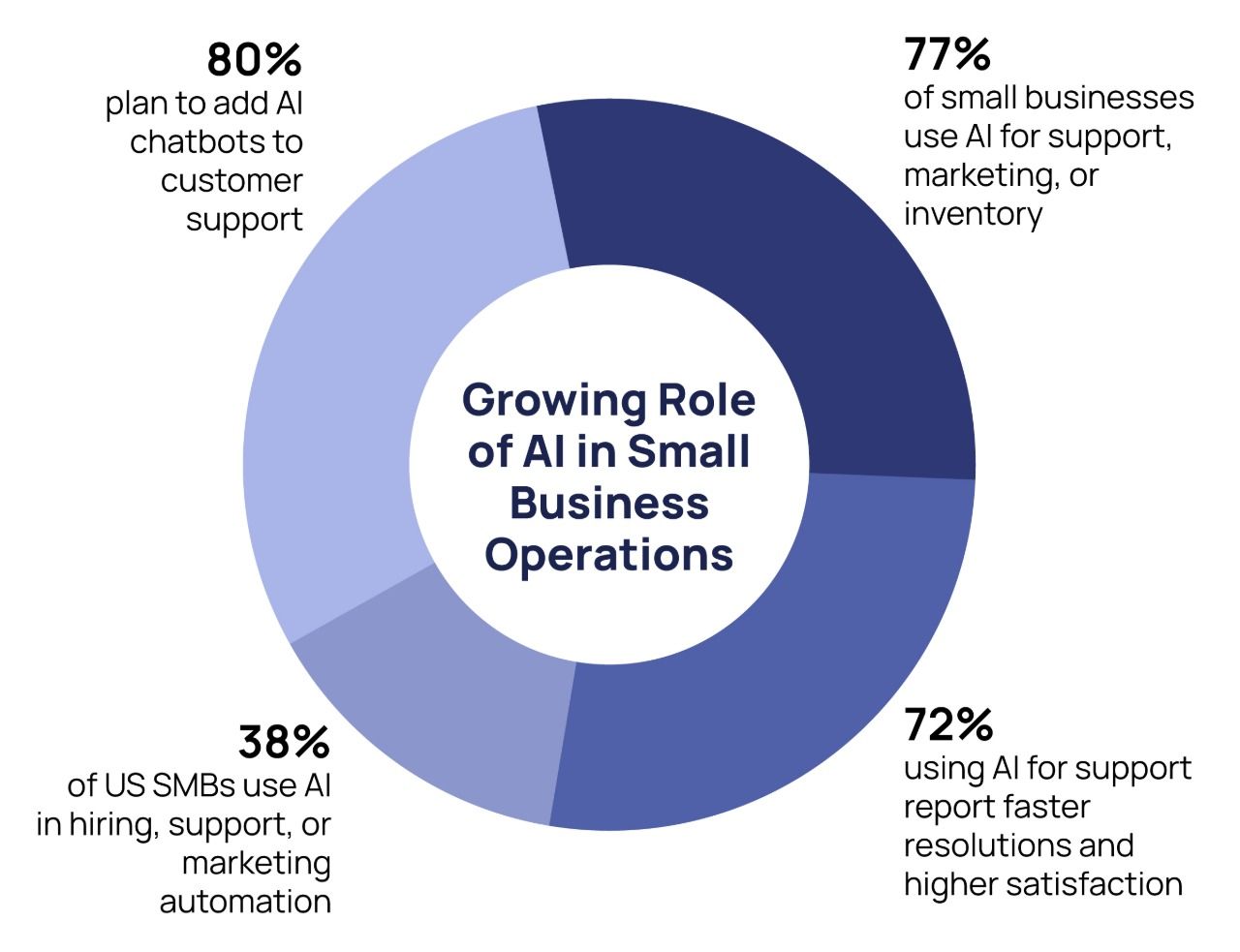
AI for Small Businesses: Affordable Solutions for Big Impact

Wish you could get more done without hiring more people? AI for small business lets you offload repetitive work, while AI for marketing helps you stay visible and relevant to your audience. Together, they help you work faster without burning out your team. Wondering what are the most cost-effective AI solutions for small businesses? Scroll down to read the blog and see where to begin.
Simplifying Daily Operations in Small Businesses with AI
Running a small business means juggling too much with too little time. That is where AI can help, not as a buzzword but as a real solution to everyday problems. If you have been wondering how to use AI for small business tasks, the answer is simple; start with the work that slows you down. Think inbox overload, repetitive admin, or delayed customer replies. These are not just annoyances; they are friction points that AI can smooth out quickly.
You can use it to draft emails, write blog posts, organize data, or handle common customer questions. Most tools are easy to pick up, affordable AI for small business operations, and surprisingly effective. Try them internally first within your team before using them with customers. It gives your staff space to learn and gives you time to fine-tune.
The point isn’t to replace people; it’s to eliminate the repetitive tasks, so your team can focus on more meaningful work. Start with one minor fix. Test it. See what works. Then, build from there. Keep it focused and let AI quietly handle the tasks that slow you down.
Practical Ways to Use AI for Small Business Growth
You don’t need a big team or budget to start using AI. With the right tools, you can simplify daily tasks, get insights from your data, and support your team more effectively. That’s how AI for small business growth starts through real, actionable improvements.
Let’s look at a few practical ways to use AI for small business:
Write Better Emails Faster
AI can help you write clear, effective emails without spending too much time. You can get suggestions for subject lines, tone improvements, grammar fixes, and even complete drafts. This helps you move quickly and sound more professional. Always review the content before sending, but let AI marketing tools for small businesses help you get unstuck or polish your message.
Use Smarter Chatbots for Customer Support
Modern AI chatbots don’t just give scripted replies, they understand and respond more naturally. You can use them to answer customer questions, take orders, or guide visitors through your website. Begin by considering what your customers need most. Select a chatbot tool that aligns with your technical expertise and business objectives. Some options require no coding and work well for AI for customer outreach.
Simplify Your Accounting Tasks
AI can sort transactions, catch unusual activity, and help you stay on top of cash flow. It can also predict trends using past data and streamline tasks such as invoicing or expense management. These AI tools for productivity are now being integrated into many accounting platforms you may already use, making them easier to adopt without a significant learning curve.
Make Your CRM Smarter
AI-powered CRM tools can help you gain a deeper understanding of customer behavior. You can receive recommendations on when to follow up, which customers are likely to buy again, or which promotions to run. AI can also improve sales forecasts by analyzing your past performance and current trends. This level of AI-driven analytics provides you with better insights for planning and decision-making.
Speed up Content Creation
When you’re short on time, AI can help you write drafts, revise existing content, or come up with ideas. You can use it for blog posts, product descriptions, captions, and more. These are good examples of AI in small businesses that reduce workload while improving output. Ensure you review the content before using it.
Get Better Market Insights
AI can collect and analyze data from surveys, social media, and website traffic. It helps you identify patterns, predict market changes, and gain a deeper understanding of your customers. This is part of how to utilize artificial intelligence in marketing for more precise targeting. You can also track competitors and break your audience into clear segments.
Strengthen Cybersecurity
AI tools can monitor for threats in real time and alert you if something appears suspicious. They analyze large amounts of data quickly to detect malware, phishing, and other risky behaviors. You can also use AI to sort risks by priority and automate some responses, saving you time and reducing exposure.
Improve Your Hiring Process
AI can help you write more precise job descriptions and sort through resumes faster. It compares skills and experience to your job needs and flags good matches. You can also use it to find candidates by scanning public profiles and databases. That’s small business automation in your HR process.
Addressing Key Barriers to AI Adoption in Small Businesses
AI can help small businesses improve efficiency and customer experience, but it also brings real operational and ethical concerns.
Here are some key issues SMBs face and how to manage them:
Data Privacy: Earning Trust While Using Personal Data
Challenge: AI-driven personalization requires customer data. Small businesses must walk a fine line between using data effectively and respecting customer privacy.
What You Can Do:
- Be transparent about what data you collect and how you use it
- Avoid sharing with third parties unless it’s necessary, and disclose any such sharing
- Use encryption and anonymization to protect sensitive data
- Integrate AI tools into your existing security frameworks
Why it matters: Customers expect personalized service, but they also expect honesty and data protection. Mishandling data can damage trust faster than it builds value. Customer engagement AI tools must operate within your privacy guidelines.
Lack of Standardization: Fragmented Tools, Unclear Rules
Challenge: The lack of standardization in AI tools creates confusion. Choose low-cost AI software that aligns with regulations and has clear support.
What You Can Do:
- Select AI tools that comply with recognized data regulations, such as GDPR or CCPA
- Don’t assume compliance, ask for proof
- Collaborate with vendors who proactively update and audit their tools to ensure regulatory alignment
Why it matters: If your AI solution mishandles data or operates outside legal bounds, the liability falls on your business, not the vendor.
Cost and Expertise: Limited Resources, High Expectations
Challenge: Many AI tools require technical knowledge and setup costs. Small businesses often lack dedicated teams to manage, train, and fine-tune these systems.
What You Can Do:
- Begin with low-complexity tools that offer a clear return on investment (ROI)
- Use platforms with built-in support and user-friendly interfaces
- Invest in basic training for key employees before scaling further
Why it matters: Start with what are the most cost-effective AI solutions for small businesses—tools that are simple, useful, and offer support. Avoid tools that need heavy customization or maintenance unless you’re ready.
Change Management: Getting Your Team Onboard
Challenge: AI adoption often requires modifying existing workflows. Without clear communication and buy-in, employees may resist new systems.
What You Can Do:
- Explain how AI supports their work rather than replacing it
- Offer training and involve staff in early testing
- Use feedback to refine the rollout of tools
Why it matters: Explain the benefits clearly. For example, use case-driven AI tools in marketing or admin that improve speed without disrupting workflows. Use this as part of your internal guide on how to utilize AI for small businesses successfully.
Scalability: Knowing When to Expand
Challenge: Jumping into AI at full scale without testing can lead to waste or failure. Not all tools deliver value in the early stages of development.
What You Can Do:
- Pilot AI solutions on a small, measurable part of your business
- Track outcomes and use data to decide if and where to expand
- Don’t lock into long-term contracts until you see consistent results
Why it matters: Test small before scaling. Want to know how can small businesses achieve big impact with AI? Start with one department or task, measure the ROI, and expand based on actual results.
“There will be two kinds of companies at the end of this decade: those who are fully utilizing AI, and those who are out of business.”
AI Best Practices Every Small Business Should Follow
Implementing AI in a small business isn’t a plug-and-play move. It needs planning, alignment with existing operations, and a clear understanding of its role. AI works best when it supports real business needs, not when it’s tacked on to follow a trend.
Here are structured steps to help you apply AI effectively in your business:
Focus on Targeted Applications
Avoid rushing into AI adoption without a purpose.
- Start by identifying specific business tasks or workflows where AI can add value, such as automating repetitive tasks, enhancing customer support, or improving decision-making
- Research tools that are specifically designed to solve those problems rather than selecting generalized AI products that promise too much
- Stick to minor, measurable improvements. Ask yourself: What are the best affordable AI tools for small businesses? Then, test them on real tasks, such as follow-ups, scheduling, or customer service
Assess Compatibility with Current Systems
Don’t assume your existing software can easily handle AI integration.
- Check how your current systems work, especially if they’re custom-built or not cloud-based. These setups often struggle with the real-time data access that AI tools need
- Consider exploring integration paths early, such as APIs or middleware, to prevent issues like data loss or latency
- Check for best low-cost AI analytics tools for startups that integrate easily and don’t require extensive IT overhead
Prepare and Involve Your Team
Tech adoption fails when people don’t know how to use it or why they should use it.
- Get your team involved before launching AI tools. Walk them through what the tools do, how they interact with daily operations, and what new tasks (if any) will come up
- Define boundaries around how AI should be used, especially with customer or operational data
- Set expectations: what AI can help with, what still needs human oversight, and how outcomes will be measured
The Next Phase of AI Adoption in Small Business
AI is becoming more embedded in small business operations, moving beyond basic automation and surface-level tools. Many current solutions labeled as AI offer limited functionality, often just basic data sorting or simple personalization. But that’s starting to change. We’re seeing a shift toward deeper integration, where AI becomes an integral part of how tools and systems function. This includes hardware designed to support complex AI tasks without relying on cloud access, making advanced processing more accessible for smaller operations.
Generative AI is also evolving. It’s already being utilized for tasks such as content creation, chatbots, and customer targeting. However, as language models continue to improve, we can expect to see more specialized applications tailored to specific industries. These targeted models could yield better results and require less computing power, making them more practical for small businesses.

Streamline and Scale Your Small Business with JynAI Essentials
JynAI Essentials gives you practical AI tools built specifically for your industry. Whether you’re in property management, law, retail, or hospitality, Essentials helps you simplify operations, work smarter, and solve the problems that matter most to your business.
You don’t have to learn new systems or start from scratch. Essentials plug into your existing tools, adding AI where it matters, automating repetitive tasks, enhancing accuracy, and providing real-time insights you can utilize. You’ll spend less time on admin and more time running your business. Instead of juggling disconnected apps and generic AI platforms, you get a single solution that seamlessly integrates with your workflows. Essentials adapts to how you already operate, giving you better control, faster decisions, and fewer headaches.
Want to see how JynAI Essentials can work for your business? Contact us at JynAI Essentials to get started.
FAQs
How can AI help small businesses compete with larger companies?
AI automates tasks and delivers insights that help small businesses act faster and smarter. You can personalize offers, improve customer experience, and make data-driven decisions. This flexibility often outpaces slower, large-scale operations.
How does AI help with inventory and supply chain management?
AI forecasts demand adjusts stock levels and automates reordering to avoid overstocking or shortages. This reduces manual tracking and improves cash flow. It’s beneficial when margins are tight.
What’s the ROI of investing in AI for small businesses?
AI saves time, increases accuracy, and improves decision-making. You often see results in better customer engagement and reduced costs. Starting small can still lead to measurable impact.
Can AI help with customer retention?
AI analyzes customer activity to flag potential drop-offs and trigger personalized messages or offers. It helps you respond before customers leave. This strengthens relationships and boosts long-term value.
What’s a good starting point for small businesses new to AI?
Select one area, such as customer support or email marketing, that consumes time or yields inconsistent results. Use AI to automate or optimize that task. Start simple and expand once you see the benefits.
Are You Ready to Make AI Work for You?
Simplify your AI journey with solutions that integrate seamlessly, empower your teams, and deliver real results. Jyn turns complexity into a clear path to success.

Are You Ready to Make AI Work for You?
Simplify your AI journey with solutions that integrate seamlessly, empower your teams, and deliver real results. Jyn turns complexity into a clear path to success.



